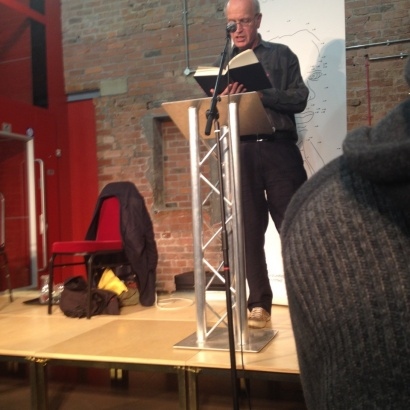 Chapter & Verse Blog
Chapter & Verse Blog
The Manchester Literature Festival Blog
Review: Iain Sinclair at the Burgess Foundation
Iain Sinclair enjoys a good walk. Arriving in Manchester after a 20-minute delay outside Piccadilly station, he was frustrated there wasn’t time to walk round Manchester, “to earth all your molecules” and face “the challenge of talking on top of Anthony Burgess’s typewriters”.
As a writer who excavates the history and memories of spaces and places, of London in particular, the focus on American writers of the 1950s and 1960s in new book American Smoke is a departure. He was seemingly marooned in Hackney and “never had the imagination to leave” while he was “building up an argument with place and what was happening to that place over a very long period of time”. Yet, writers such as Jack Kerouac, Charles Olson and the Black Mountain College in Carolina still exerted their influence and would inform this exploration of American time and space.
The catalyst lay, he said, in the mid-1990s when he was drawn back to these Beat poets and writers on a whistle stop tour of their cultural ley lines for a BBC documentary, including a pilgrimage to meet the retired William Burroughs in Kansas. This experience and his current feeling London was losing its locality, citing the Olympics as cultural vandal where the details of cultural particulars and contours were being swamped by global corporatism, resulted in a shift of perspective.
His readings cited the influences of Charles Olson and Allen Ginsberg. Sinclair brought the dominating presence of Olson exquisitely to life in a challenging encounter, “a head-to-head thing” with the slowly disintegrating Kerouac, where the drunken Kerouac is confronted with a scathing newspaper review of his last book on the icy steps of Olson’s home.
Sinclair also time traveled to 1967 and making Ah! Sunflower, his film of the Dialectics of Liberation conference at the Roundhouse and the close encounters with Ginsberg, Burroughs, Stokely Carmichael and Gregory Bateson. He underlined the importance of connections, the toing and froing between the counter-cultures of America and Britain in the 1960s, and how this interweaving has sadly unraveled.
Linking Ginsberg to Blake’s Jerusalem, Sinclair unearthed counter-cultural parallels with the druidic Primrose Hill and the ancient Serpentine. The mass nostalgic hypnosis of events like the Olympics transformed his city, into the locus for a “sexualised hysteria”, and he felt the Hill is symbolic of how the inner eye of the imagination, “the novel of memory”, has since been concreted over.
A fascinating evening with a writer who refuses to be told to look at things in a certain way, he sifts the provisional, the fallible, the topography of his memory and prefers to walk these inner landscapes. Ironically, he conjured the spirit of Burroughs, a sage at the end of his writing life looking after cats and making paintings, having exhausted the landscapes of his imagination. For Sinclair, there is a feeling American Smoke is just one of many spaces he still has left to explore.
About the writer: Frank Collins has been writing about cinema, television, books, theatre and music since 2007 on his blog Cathode Ray Tube. He has also been widely published in print and other websites on such diverse subjects as Doctor Who, Coronation Street creator Tony Warren and contemporary craft and design.


